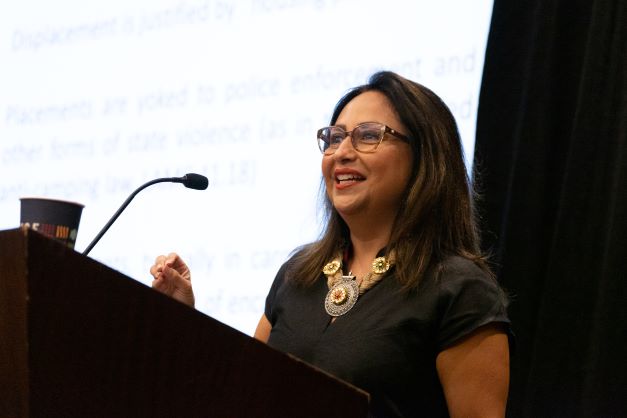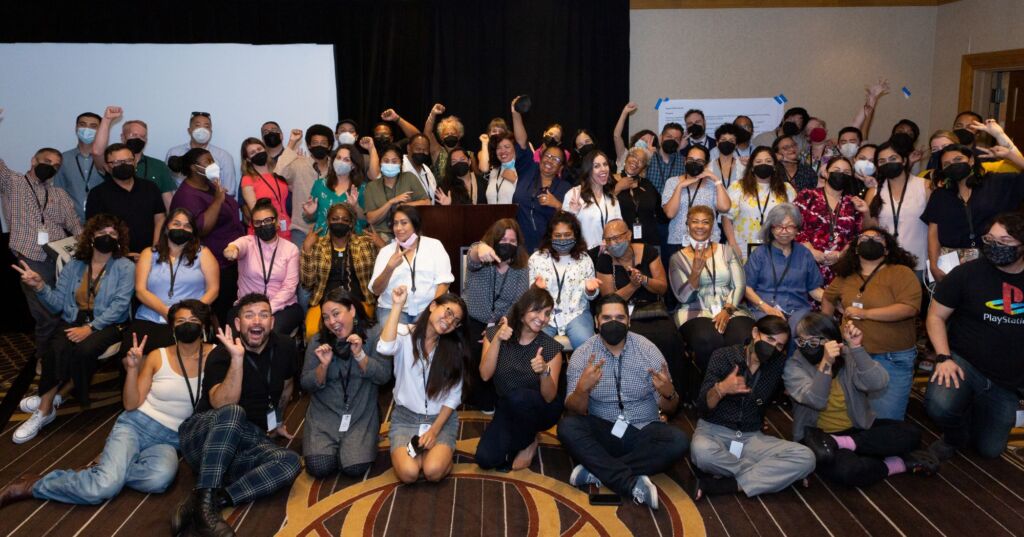[VIDEO] F4ICA Statewide Convening: Gathering and Grounding In Community-Led Strategy
Representing the diverse communities and interests across the five California regions of the Fund, the eight member Strategy Working Group shared an initial draft of the strategic plan which was a product of several strategy meetings, going through notes from 40 one-on-one meetings with Community Advisors, one cross-regional Strategy Conversation, and a series of conversations with each of the five regions in the F4ICA. At this statewide convening, the Strategy Working Group shared how they integrated the information and analysis as well as the logic behind the draft plan and framework. They reflected how this process has been a powerful example of community and philanthropic partnership that centers the voices of those base-building organizations.
It was affirmative for our team to hear direct feedback and guidance from Community Advisors who have been partners for years, and who we continually center in decision-making for the fund. Community Advisors and members of the Strategy Working Group expressed feeling seen and heard in the strategy documents as well as process.
They said we would drive the strategy creation. Lo and behold, that is actually how it is,” one Strategy Working Group member shared. Another Community Advisor shared, “This strategy document shows you have really been listening to us around how we think about our work and what we aspire to do.
The cultural opener, Felcia ‘Fe’ Montes of Mujeres de Maiz, as well as our emcees Derek Steele of Social Justice Learning Institute, and Dana Ginn Paredes, F4ICA Lead Consultant, set the tone for the day. We were able to breathe collectively and acknowledge the land we were on and call in the original caretakers of the land.
This convening powerfully advanced the strategic planning conversation. Community Advisors and key funder allies became clearer and more aligned around the vision for F4ICA 2.0. There was general resonance with the draft framework, goals, and strategies shared on F4ICA 2.0. A few of the main approaches that we all dove deeper into include:
— The broad category of Community Driven Affordable Housing Innovations including the various sub-components such as social housing, community land trusts, and TOPA / COPA.
— Continued capacity building and infrastructure building work, particularly at the regional level, with civic engagement and communications capacities named as important focus areas
— Discussing housing work intersectionally, particularly incorporating criminal justice and climate intersections.
We are excited to share more about the strategies the Strategy Working Group, Community Advisors and funder allies discussed, including leveraging foundation influence in public and philanthropic spheres as we finalize and adopt the approved plan in late 2022.

Professor Ananya Roy from UCLA Luskin Center for Democracy and Power ignited folks’ desire to build relationships with academia and figure out how to bridge those connections and use academia as a tool for their own campaigns. In her inspirational keynote she shared research and examples of power building and efforts on the horizon of housing justice.
The term “racial banishment” stuck with us as she explained that we are past gentrification, and are at a place where city officials and police are making staying in place illegal by so many means. Professor Roy and Community Advisors shared how urgent, and life and death, the situation is around housing for low-income people of color in California. They foreshadowed the need for more direct action as well as use of eminent domain and occupations to stop business as usual of evicting, incarcerating and banishing people from their homes and communities. Funders need to wrestle with how they support communities they work with in these moments.
We gained valuable insights and grounding in the regional context across all five geographic areas where we have focused. The conversations around community-driven affordable housing innovations and funder organizing resonated across regions and with funder partners.
We facilitated full group and break out sessions to gather information on the strategies put forth by the Strategy Working Group – to ground them in the lived experiences and context of each region and for funders aligning with this work. In regional groups, Community Advisors voted on which strategies and outcomes were high and medium priority. This prioritization exercise illuminated how regions feel about the relative priority of these goals as well as which strategies and outcomes are most important in which region. The Strategy Working Group is also looking for themes across the regions to inform the final goals, strategies, and outcomes of F4ICA 2.0.
There is enormous potential for F4ICA in our next phase, grounded in the experience and relationships of our last five years of work. The statewide convening filled us all with great hope and put us on a path to ensure that the next iteration of the fund is completely supportive of what front line communities are asking for. The second phase is taking shape – with fuller details ready to share in December and into the new year.
We’re full of gratitude, excitement and determination to see through this community-driven vision and strategies for permanent affordable housing, stewardship, and thriving neighborhoods across California.

